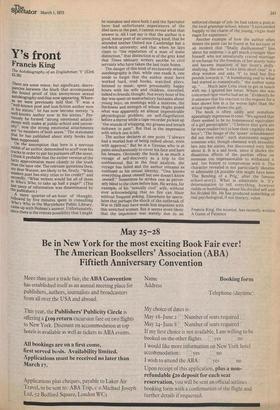Y's front
Francis King
The Autobiography of an Englishman 'Y' (Elek
There are some minor, but significant, discrepancies between the blurb that accompanied the bound proof of this anonymous sexual autobiography and that now appearing. Where We were previously told that 'Y' was a well-known poet and non-fiction author now in his sixties," he has now become merely "a well-known author now in his sixties." Previously he formed "strong emotional attachments with males at public-school and university"; now the strong emotional attachments are to members of both sexes." The statement that he has published about sixty books has been suppressed.
On the assumption that here is a nervous rabbit of an author, determined to scuff over his tracks in order to put his pursuers off the scent, I think it probable that the earlier version of the facts approximates more closely to the truth than the later one. The relevant questions then, my dear Watson, are likely to be, firstly, "What modern poet has sixty titles to his credit?" and Secondly, "What writers would list all of them in Who's Who, to take up half a page?" (This last -piece of information was disseminated by the publishers.)
A mere quarter-of-an-hour of thought, followed by five minutes spent in consulting Who's Who in the Marylebone Public Library, came up with Holmes's answer. Unfortunately, since there is the remote possibility that I might be mistaken and since both I and the Spectator have had unfortunate experiences of the libel-laws in the past, I cannot reveal what that answer is. All I can say is that the author is a good, minor poet of an unexciting kind; that he attended neither Oxford nor Cambridge but a red-brick university; and that when he lays claim to "the reputation of a man of some distinction," that distinction is of the grey kind that Times obituary writers ascribe to civil servants who have taken the last train home.
The danger of this kind of exclusively sexual autobiography is that, while one reads it, one tends to forget that the author must have worked hard, read books, watched plays, listened to music, spent presumably happy hours with his wife and children, travelled, talked to friends, thought. Not every hour of his day was spent on masturbatory fantasies about young boys; on meetings with a mistress, the thickness and strength of whose thighs posed what was apparently an almost impenetrable physiological problem; on self-flagellation before a mirror while a tape-recorder picked up "the sounds of whipping, my groans and breath indrawn in pain". But that is the impression with which one is left.
The author declares at one point "I always had a morbid fear of being talked about, even with approval." But he is a Tiresias who is at pains simultaneously to cover his face and bare his breasts. Obviously the book is as much a voyage of self-discovery as a trip to the confessional. But in the final analysis, the voyage has failed and the author remains as confused as his sexual identity. "One knows everything about oneself but one doesn't know oneself." Sometimes he strikes one as perversely blind to the clues before him. He writes, for example, of his "sexually cool" wife, without ever acknowledging that no fire can blaze without frequent poking. Elsewhere he speculates that perhaps the shock of the outbreak of War in 1939 may have made him impotent with this wretched woman. But it seems more likely that the impotence was merely due to an enforced change of job: he had taken a post at the local grammar school, where "I succumbed happily to the charm of the young, virgin male eager for experience."
Another example of how the author often misses the point can be found in his account of an incident that "finally disillusioned" him about his mistress a girl much younger than himself, who not unnaturally craved marriage in exchange for the freedom of her sturdy loins and became impatient of her lover's shillyshallying. She sees "a nice little short coat" in a shop window and asks 'In to lend her five pounds towards it. "A humiliating end to what had started so romantically," the author sums up. ". . . Much later Celia tried to get in touch with me. I ignored her letter. Where she was concerned rigor mortis had set in." Evidently he is unaware that his reaction to the request for a loan shows him in a far worse light than the actual request shows the girl.
The book is often oddly and somehow appealingly ingenuous in tone. "We agreed that there seemed to be no homosexual equivalent of a girl gerontophile"; "I believe that girls are far more readier (sic) to lose their virginity than boys"; "The image of the 'queer' schoolmaster did not then exist": such statements suggest someone who, though obsessed with sexuality late into his sixties, has discovered very little about it. It is a sad book, since it shoWs the disastrous effects of the puritan ethos on someone too impressionable to withstand it and too honest to compromise with it. The character revealed is not particularly likeable or admirable (A possible title might have been `The Bending of a Prig,' after the famous school-story). What is admirable is 'Y's' determination to tell everything, however risible or humiliating, about his divided self and his divided life. He has produced something of real psychological, if not literary, value.
Francis King, the novelist, has recently written A Game of Patience

































 Previous page
Previous page